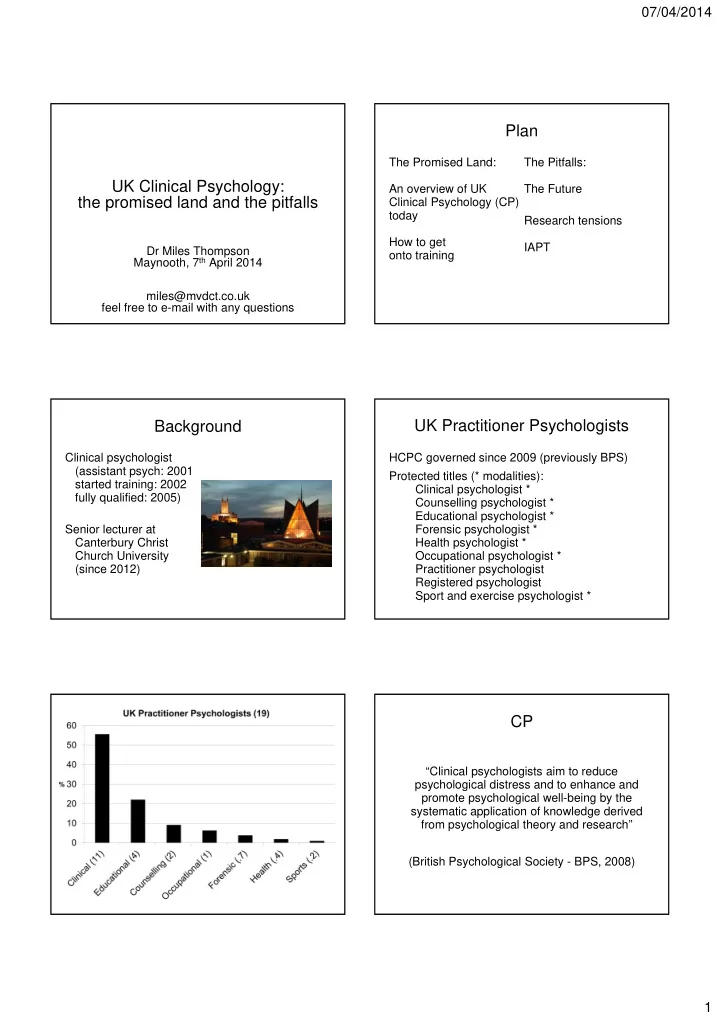

07/04/2014 Plan The Promised Land: The Pitfalls: UK Clinical Psychology: An overview of UK The Future the promised land and the pitfalls Clinical Psychology (CP) today Research tensions How to get IAPT Dr Miles Thompson onto training Maynooth, 7 th April 2014 miles@mvdct.co.uk feel free to e-mail with any questions Background UK Practitioner Psychologists Clinical psychologist HCPC governed since 2009 (previously BPS) (assistant psych: 2001 Protected titles (* modalities): started training: 2002 Clinical psychologist * fully qualified: 2005) Counselling psychologist * Educational psychologist * Senior lecturer at Forensic psychologist * Canterbury Christ Health psychologist * Church University Occupational psychologist * (since 2012) Practitioner psychologist Registered psychologist Sport and exercise psychologist * CP “Clinical psychologists aim to reduce psychological distress and to enhance and promote psychological well-being by the systematic application of knowledge derived from psychological theory and research” (British Psychological Society - BPS, 2008) 1
07/04/2014 Faculties with the DCP Faculties with the DCP Addictions CYPF Children, Young People and their Families Paediatric, Looked after children, learning Clinical Health Psychology disabilities, Forensic Eating Disorders CHP Forensic Cardiac, Diabetes, Obesity, Pain, Renal, Holistic Respitatory Intellectual Disabilities PCMH Oncology and Palliative Care Rehabilitation & Recovery, Family Interventions, Perinatal Psychology CMHT, Social Inclusion, Assertive Outreach, Psychosis & Complex Mental Health Early Intervention, Acute and Crisis Network Older People Sexual Health and HIV How to get onto training 2:1 or 1st class Psychology degree Graduate Basis for Chartership (BPS GBC) & Relevant experience How to get onto training Clinical: assistant psychologist, health worker. Academic: Masters, PhD & 3 year Professional Doctorate in Clinical Psychology (DClinPsy) on one of 30 courses Note two bottle necks How to get onto training Clearing House for Postgraduate Courses in Clinical Psychology http://www.leeds.ac.uk/chpccp/ Success rate: 2013=16%, 2012=15% 3,725 applicants for 594 places 1 in 6.27 applicants got a place on a course Do not be put off 2
07/04/2014 How to get onto training Potential pitfalls: Thinking academic qualifications hold the key Having clinical experience in only one job / area Poor performance in the reflective interview Poor writing skills on your personal statement Secret weapon: Time Plan The Future The Promised Land: The Pitfalls: What does the future hold for CP? Government policy demands that the NHS: An overview of UK The Future - shows value for money Clinical Psychology (CP) - reduces costs today Research tensions - more competition for clients - CPs dealing with more complex problems How to get IAPT onto training - lower wages for longer - less automatic career progression - quicker / cheaper routes to qualification (Wright, 2010) CP CP “Clinical psychologists aim to reduce "Psychotherapy is an psychological distress and to enhance and unidentified technique promote psychological well-being by the applied to unspecified problems systematic application of knowledge derived with unpredictable outcomes from psychological theory and research” for which long and rigorous training is required” (British Psychological Society - BPS, 2008) (Raimy, 1950, p.93) 3
07/04/2014 Research tensions Research tensions Development of clinical psychology Research activity in US clinical psychology US research: Levy (1962) Checked all US clinical psychologists who USA: Boulder, 1949: Scientist-practitioner model qualified in 1953-1954 against publications in Train as scientist 1st, then practitioner (PhD) Psychological Abstracts from 1948-1960 USA: Vail, Colorado 1973: Creation of Psy. D. N=781, publications=2,922 More practice, less science M=3.7, Md=1.6 29% 0 pubs, 19% only 1 pub 10% of subjects accounted for 45% of pubs UK: claims to be scientist-practitioners Research tensions Research tensions Research activity in UK clinical psychology Process (not just outcome) "Modal number of publications zero" - Not just does it work, but how does it work? - How does the theory say it should work? Trainees: only one out of four trainees publish - What evidence is there that it works this way? their thesis (Cooper & Turpin, 2007) - Is there any evidence that this isn’t the case? The people training the trainees: “whatever may be the basis of change with CT, modal number of publications zero, median=3 changes in cognitions, as originally proposed, (Newnam & McKenzie, 2011) are not necessary conditions for therapeutic change” Kazdin*, 2009 p.420. (*APA President 2008) IAPT IAPT Improving access to psychological therapies Provide a choice of evidence-based therapy The basic idea: increase psychology provision Within waiting time targets With rapid referral to consultant-led specialist First suggested in 2005 by Layard: services if first line treatment fails “There are now more mentally ill people Improve self-help facilities drawing incapacity benefits than there are unemployed people on Jobseeker’s Allowance” Facilitate a rapid return to work And reduce stigma in society Mental Health: Britain’s Biggest Social Problem (http://www.iapt.nhs.uk/) 4
07/04/2014 IAPT IAPT Low intensity: mild to moderate 2006 / 2007: Launch Assess. Provide guided self help – e.g. books - pilot sites in Doncaster and Newham Psychological Wellbeing Practitioners (PWPs) - only anxiety and depression, only adults One-year training Accredited through the BABCP/ BPS 2011: nationwide No psych or degree background needed - children and young adults - long term physical conditions High intensity: moderate to severe - medically unexplained symptoms HITs: clinical psychologists, CBT therapists, - severe mental illness counsellors, nurses, occupational therapists… 2012 – IAPT workforce approx. 5,800 IAPT – is it working? Time-series analysis of antidepressant prescribing rates of all 151 PCTs in England from 2008-11 (Sreeharan et al. 2013) General pattern: Prescribing rates increased by 10% during the study (ratio = 1.10, 95% CI = 1.09 to 1.10) IAPT PCTs: IAPT v no IAPT. No significant effect (ratio = 0.99, 95% CI = 0.99 to 1.00) Plan The Promised Land: The Pitfalls: An overview of UK The Future Clinical Psychology (CP) today Research tensions How to get IAPT onto training 5
Recommend
More recommend